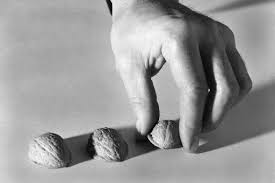
The Magic Water is fiat currency, in this case the U.S. Dollar. The 19 Elders are the Federal Reserve's pet banks, the 18 Primary Dealers, and Ben Bernanke. The Oasis is the Ponzi scheme the U.S. Treasury is running to finance its huge deficits. Hopama is obviously Obama, who has been seduced by Wall Street (if any seduction was necessary) into playing the Too Big to Fail (TBTF) game.
The Wall Street insiders do, in fact, own the U.S. government. We have arrived at the political arrangement which my old Berkeley prof, Sheldon Wolin (in his book Democracy, Inc.), calls "inverted totalitarianism," a variant of Fascism where, as between the central government and big business, business now calls the shots. Wolin is a dyed-in-the-wool Leftist, but these Left/Right labels do not really matter anymore. All that matters is acquiring a systematic understanding of how the scam works. It works this way:
The federal government has huge deficits, borrowing nearly half of all it spends annually. While the government had very large debts before the financial crisis began in 2007, they have exploded with TARP, the stimulus (ARRA), et cetera, so that they are now running at $1.5 trillion per year. The deficit is blowing out at both ends: tax revenues have fallen about 25% (total income, inclusive of Social Security, is about $2.1 trillion), while spending has increased by about 1/2 trillion annually. The Social Security surplus is now no longer raided to disguise deficits (as under Bush) because there is no surplus.
The Treasury and Federal Reserve have two large problems: (1) how to sell enough government paper to keep up with the new debt (deficits) and buy up the rollover debt which keeps maturing; and (2) how to keep the interest rate low enough on such debt so that debt service does not simply eat up the entire federal budget. The Federal Reserve does not want to appear to be simply "printing money." This debases the currency even further than the current spot price of gold, $1,300 per ounce, would suggest has already happened. Another clue in terms of the value of U.S. money is the cost of gasoline and food; why, in a period of sharply falling demand, are the prices of these basic commodities going up? Answer: both are based on the cost of imported oil.
Thus, Welcome to the Midway: the shell game played by Chief Carnie Ben Bernanke with his inner circle of Elders, the 18 Primary Dealers. It's fun, it's easy, and you can't play, too. The key to winning is to have already won, that is, to be a bank Too Big to Fail. If you are, then you become eligible for direct business dealings with the Federal Reserve, which essentially is the only game in town, or the Magic Oasis. You can borrow money dirt cheap through amenities available only to you, such as the Primary Dealer Credit Facility or the Fed's discount window, at the ludicrously low rate of .25%, meaning one quarter of one percent. Where, then, might you find a guaranteed return on your borrowed loot? By buying Treasuries, which pay somewhat more than your borrowing cost. Another way to raise money is to sell all the worthless shit on your books, such as bonds made out of mortgage-backed securities, to the Fed in exchange for "cash." The Fed sweetens such deals by pretending these bonds have a market value, and pay you at "par," meaning the face amount the bonds were considered equal to in some hashish-filled den in the basement of Goldman Sachs back in 2005. These "assets" then sit on the books of the Federal Reserve (its balance sheet has expanded from about $800 billion to about $2.2 trillion over the last two years) until they die.
Where does the Fed get the "money" (Magic Water) to buy MBS bonds or to lend to the Primary Dealers? It prints the money. The Fed conjured $1.5 trillion into existence in order to take out the trash sitting on the books of all the TBTFs and to buy treasuries (in essence from itself) during its period of "Quantitative Easing," which was, however, just the beginning.
To summarize the game: the U.S. Treasury maintains its checking account at the Federal Reserve. It draws on this money to finance its operations. The Treasury doesn't "make" nearly enough money from its "income" (taxes), so it borrows the huge difference. Increasingly (as foreign creditors lose interest in playing), the deficit is papered over by the Federal Reserve's "Open Market" and lending operations in furnishing printed money through loans to, and purchases of trash from, the TBTFs. The Primary Dealers use a lot of this virtually free money to buy Treasuries to lock in a spread between their ludicrously low borrowing rate and the ludicrously low coupon rate paid by Treasury bonds. This "cash" from the Primary Dealers is deposited in the Treasury's checking account at the Federal Reserve. Thus, the origin of the money in the Treasury's checking account at the Federal Reserve is money which the Fed printed and ran through the Primary Dealers so that it would like an "investment" instead of a fee for money-laundering. The Fed, in other words, prints the deficit and incurs a fee of 2-3% for the use of its ATM at the Primary Dealers.
The complexity of the system disguises its true nature. The Federal Reserve of New York has all kinds of "rules" and "regulations" on the quality of "collateral" which must be posted in order to borrow, and blah blah blah. Bear in mind the simplest maxim of engineering: the power flowing through a system defines the system. 40 million Americans are on food stamps while a handful of financial criminals make millions per year idly tapping a few keyboard keys and locking in a return which would have made Croesus realize he'd been wasting his time. And all with assistance of your federal government.


